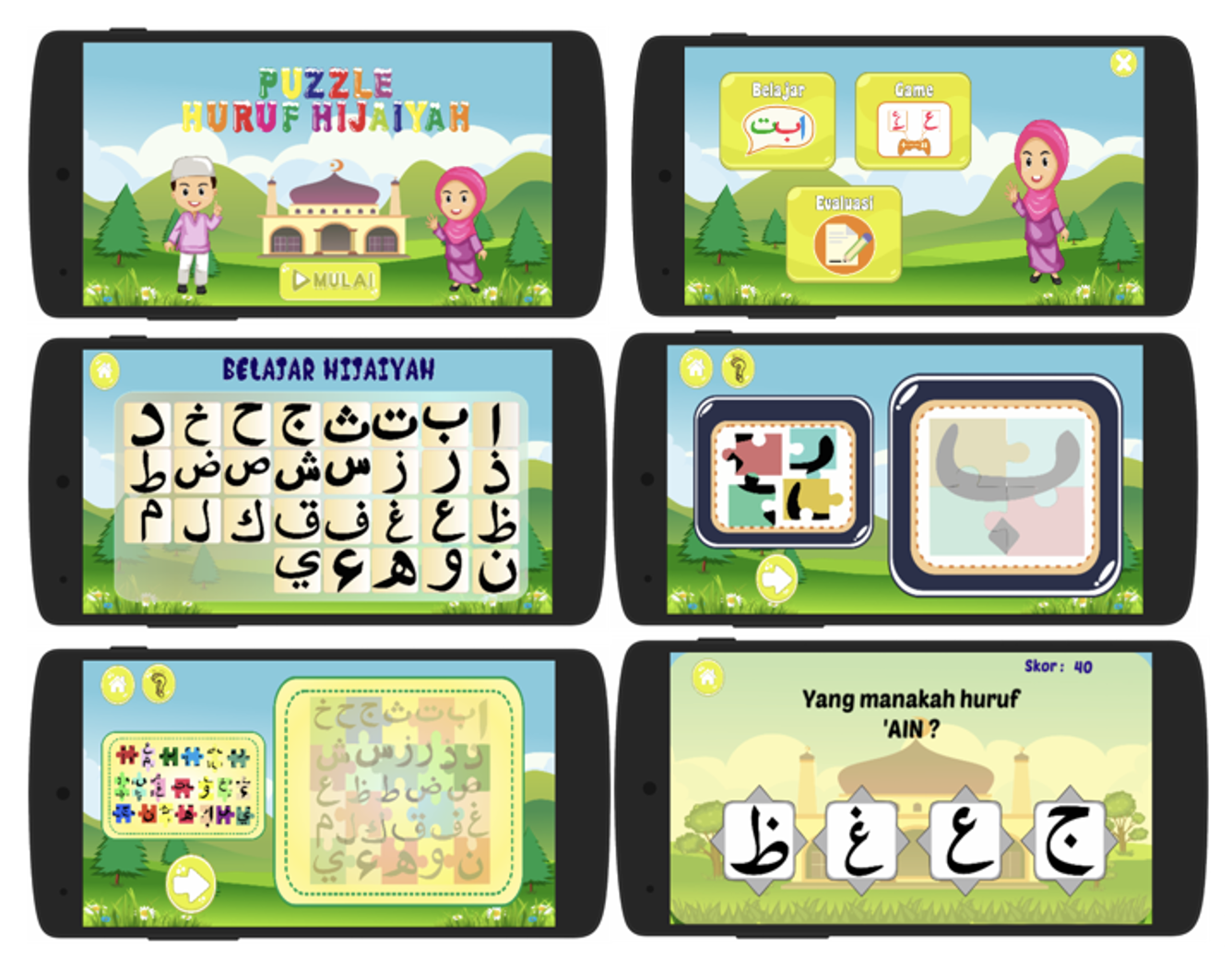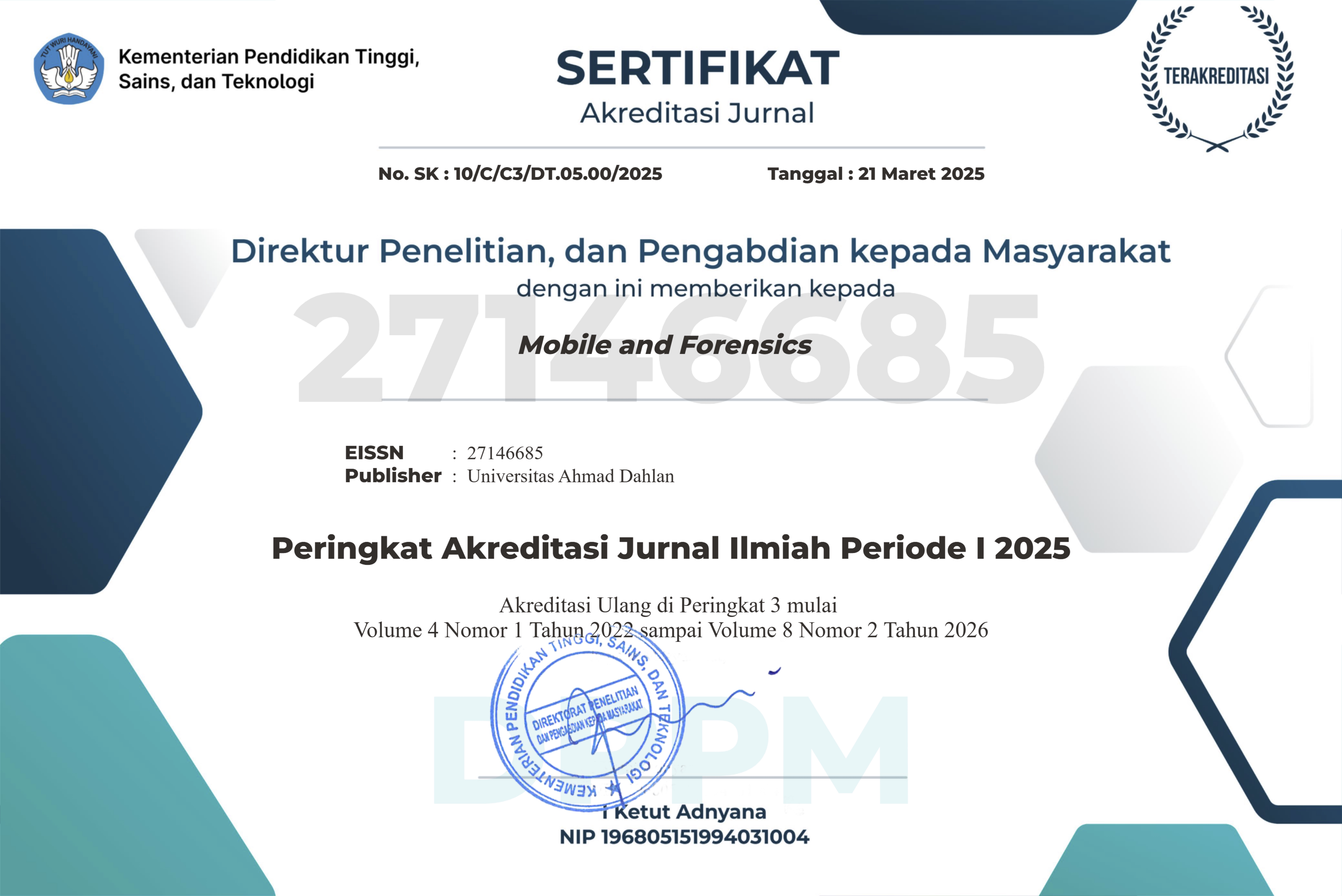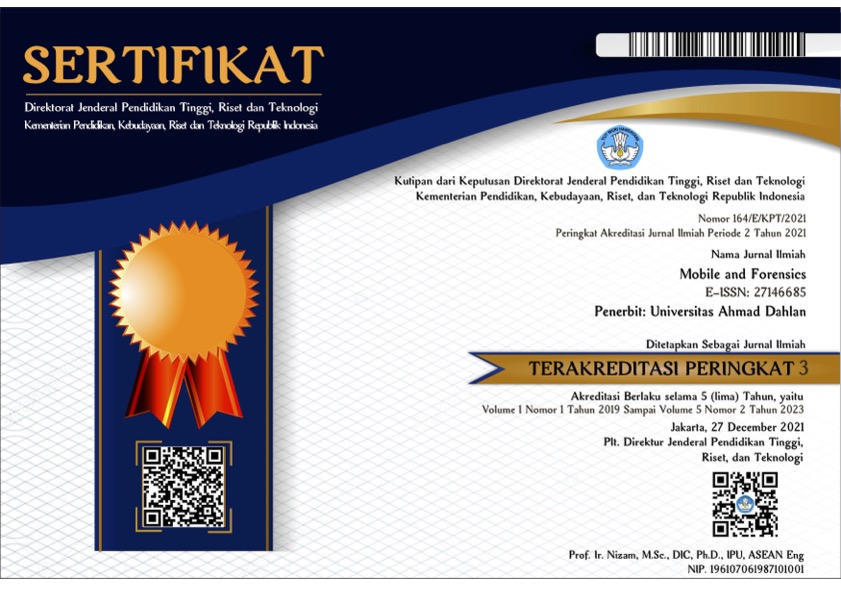Early Childhood Mobile Puzzle Game for Learning Hijaiyah Letters
DOI:
https://doi.org/10.12928/mf.v4i2.6355Keywords:
Puzzle, Multimedia, Hijaiyah, Early Childhoood, Mobile ApplicationAbstract
The use of Arabic in Muslim worship activities is the main and dominant thing to do, especially in the activities of praying and reading the Qur'an. The Arabic language in these two activities is presented in Hijaiyah letters, so that the ability to read Hijaiyah letters is very obligatory and necessary for Muslims from an early age, through learning and playing activities. Salman Al Farisi I Kindergarten in the Yogyakarta area, Indonesia, has taught its students to learn to read Hijaiyah letters. One of the learning activities to recognize Hijaiyah letters is a puzzle game. This study aims to develop a multimedia application for learning Hijaiyah letters. The application was developed according to the needs of early childhood with the concept of a learning environment and playing through smartphone devices. User-Centered Design (UCD) was used in this study which consisted of six steps: Identifying Needs, Determining Context of Use, Determining Needs, Generating Solution Design, Design Evaluation, and Implementation. This research produces applications that suit system requirements and user needs with good multimedia quality. The results of testing the quality of multimedia show that the application gets a score of 4.53 out of a scale of 5. This score shows that the application has a very good rating.
References
E. A. Khan and M. K. Y. Shambour, “An analytical study of mobile applications for Hajj and Umrah services,” Applied Computing and Informatics. 2018. doi: 10.1016/j.aci.2017.05.004.
X. Cai, J. Cebollada, and M. Cortiñas, “From traditional gaming to mobile gaming: Video game players’ switching behaviour,” Entertainment Computing, vol. 40, 2022, doi: 10.1016/j.entcom.2021.100445.
S. Mishra and G. Malhotra, “The gamification of in-game advertising: Examining the role of psychological ownership and advertisement intrusiveness,” International Journal of Information Management, vol. 61, no. August 2020, p. 102245, 2021, doi: 10.1016/j.ijinfomgt.2020.102245.
K. Arbeau, C. Thorpe, M. Stinson, B. Budlong, and J. Wolff, “The meaning of the experience of being an online video game player,” Computers in Human Behavior Reports, vol. 2, no. May, p. 100013, 2020, doi: 10.1016/j.chbr.2020.100013.
N. Fachada, “ColorShapeLinks: A board game AI competition for educators and students,” Computers and Education: Artificial Intelligence, vol. 2, no. November 2020, p. 100014, 2021, doi: 10.1016/j.caeai.2021.100014.
R. Rachmadtullah, Z. MS, and M. Syarif Sumantri, “Development of computer-based interactive multimedia : study on learning in elementary education,” International Journal of Engineering & Technology, vol. 7, no. 4, p. 2035, 2018, doi: 10.14419/ijet.v7i4.16384.
X. Xu, “Study on effective using of multimedia teaching system and enhancing teaching effect,” International Journal of Emerging Technologies in Learning, vol. 12, no. 6, pp. 187–195, 2017, doi: 10.3991/ijet.v12i06.7093.
I. B. Kerthyayana Manuaba, “The Design and Game Mechanic of Combined Game Application Prototype for Learning Social Business,” Procedia Computer Science, vol. 135, pp. 52–59, 2018, doi: 10.1016/j.procs.2018.08.149.
J. Tyerman, M. Luctkar-Flude, and C. Baker, “Rapid Development of a COVID-19 Assessment and PPE Virtual Simulation Game,” Clinical Simulation in Nursing, vol. 56, pp. 125–132, 2021, doi: 10.1016/j.ecns.2021.03.002.
R. M. Flynn, E. Kleinknecht, A. A. Ricker, and F. C. Blumberg, “A narrative review of methods used to examine digital gaming impacts on learning and cognition during middle childhood,” International Journal of Child-Computer Interaction, vol. 30, p. 100325, 2021, doi: 10.1016/j.ijcci.2021.100325.
I. v. Osipov, S. Orlov, I. Egorushkin, and E. Nikulchev, “Development of a gaming application for a customized eight-processor device with a tangible interface,” Procedia Computer Science, vol. 186, pp. 777–786, 2021, doi: 10.1016/j.procs.2021.04.216.
N. Kidi, B. Kanigoro, A. G. Salman, Y. L. Prasetio, I. Lokaadinugroho, and A. A. Sukmandhani, “Android Based Indonesian Information Culture Education Game,” Procedia Computer Science, vol. 116, pp. 99–106, 2017, doi: 10.1016/j.procs.2017.10.015.
C. H. Primasari, “Strategy for achieving IT-business alignment in gaming industry in Indonesia,” Procedia Computer Science, vol. 197, no. 2021, pp. 469–476, 2022, doi: 10.1016/j.procs.2021.12.163.
J. Díaz, J. A. López, S. Sepúlveda, G. M. R. Villegas, D. Ahumada, and F. Moreira, “Evaluating aspects of usability in video game-based programming learning platforms,” Procedia Computer Science, vol. 181, no. 2019, pp. 247–254, 2021, doi: 10.1016/j.procs.2021.01.141.
G. C. da Silva, R. L. Rodrigues, A. N. Amorim, R. F. Mello, and J. R. O. Neto, “Game learning analytics can unpack Escribo play effects in preschool early reading and writing,” Computers and Education Open, vol. 3, no. December 2021, p. 100066, 2022, doi: 10.1016/j.caeo.2021.100066.
G. P. Kusuma, L. K. Putera Suryapranata, E. K. Wigati, and Y. Utomo, “Enhancing Historical Learning Using Role-Playing Game on Mobile Platform,” Procedia Computer Science, vol. 179, no. 2019, pp. 886–893, 2021, doi: 10.1016/j.procs.2021.01.078.
S. Perini, R. Luglietti, M. Margoudi, M. Oliveira, and M. Taisch, “Training Advanced Skills for Sustainable Manufacturing: A Digital Serious Game,” Procedia Manufacturing, vol. 11, no. June, pp. 1536–1543, 2017, doi: 10.1016/j.promfg.2017.07.286.
E. Jääskä and K. Aaltonen, “Teachers’ experiences of using game-based learning methods in project management higher education,” Project Leadership and Society, vol. 3, p. 100041, 2022, doi: 10.1016/j.plas.2022.100041.
K. Kiili, K. Moeller, and M. Ninaus, “Evaluating the effectiveness of a game-based rational number training - In-game metrics as learning indicators,” Computers and Education, vol. 120, no. January, pp. 13–28, 2018, doi: 10.1016/j.compedu.2018.01.012.
S. Schöbel, M. Saqr, and A. Janson, “Two decades of game concepts in digital learning environments – A bibliometric study and research agenda,” Computers and Education, vol. 173, no. July, 2021, doi: 10.1016/j.compedu.2021.104296

Downloads
Published
Issue
Section
License
Copyright (c) 2022 Wahyu Pujiyono, Bambang Robi'in, halima Tus’ Adia Seran

This work is licensed under a Creative Commons Attribution-ShareAlike 4.0 International License.
Start from 2019 issues, authors who publish with JURNAL MOBILE AND FORENSICS agree to the following terms:
- Authors retain copyright and grant the journal right of first publication with the work simultaneously licensed under a Creative Commons Attribution License (CC BY-SA 4.0) that allows others to share the work with an acknowledgment of the work's authorship and initial publication in this journal.
- Authors are able to enter into separate, additional contractual arrangements for the non-exclusive distribution of the journal's published version of the work (e.g., post it to an institutional repository or publish it in a book), with an acknowledgment of its initial publication in this journal.
- Authors are permitted and encouraged to post their work online (e.g., in institutional repositories or on their website) prior to and during the submission process, as it can lead to productive exchanges, as well as earlier and greater citation of published work.

This work is licensed under a Creative Commons Attribution-ShareAlike 4.0 International License.












 Mobile and Forensics (MF)
Mobile and Forensics (MF)